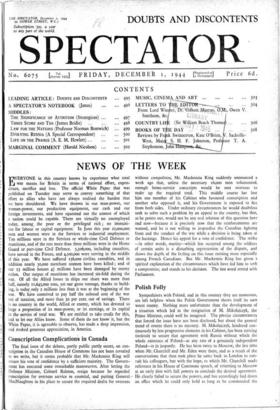NEWS OF THE WEEK
EVERYONE in this country knows by experience what total war means for Britain in terms of national effort, expen- diture, sacrifice and loss. The official White Paper that was published on Tuesday may serve to convey something of that effort to allies who have not always realised the burden that we have shouldered. We have thrown in our man-power, our woman-power, our production equipment, our cash and our foreign investments, and have squeezed out the utmost of which a nation could be capable. There are virtually no unemployed today, among the poor or the privileged rich ; no immuni- ties for labour or capital equipment In June this year 22,000,000 men and women were in the Services or industrial employment. Ten millions were in the Services or whole-time Civil Defence or munitions, and of the rest more than three millions were in the Home Guard or part-time Civil Defence. 5,5ok000, including casualties, have served in the Forces, and 4,500,000 were serving in the middle of this year. We have suffered 136,000 civilian casualties, and in addition nearly 3o,000 merchant seamen have been killed ; and of our 13 million houses 41 millions have been damaged by enemy action. Our output of munitions has increased six-fold during the war. Of all the Allied losses in ships our share was more than half, namely 11,643,000 tons, yet our gross tonnage, thanks to build- ing, is today only 2 millions less than it was at the beginning of the war. We have contrived to pay half the colossal cost of the war out of taxation, and more than 30 per cent. out of savings. There is no country in the world, Allied or enemy, which has devoted so large a proportion of its man-power, or its earnings, or its capital to the service of total war. We are entitled to take credit for this, and to let our Allies know. Some of them do not know it, but the White Paper, it is agreeable to observe, has made a deep impression, and evoked generous appreciation, in America.


























